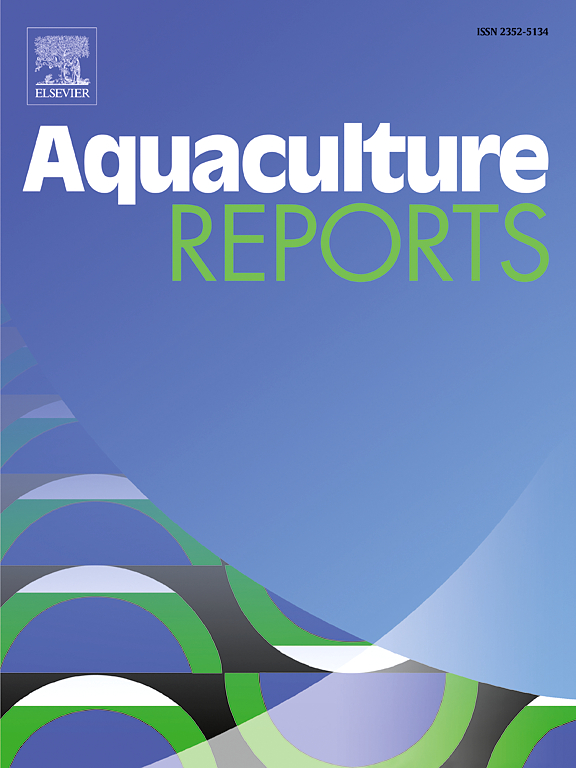Effects of rapeseed meal replacing fishmeal on growth, body composition, amino acid digestion and transport, lipid metabolism, and immunity of black carp (Mylopharyngodon piceus)
IF 3.7
2区 农林科学
Q1 FISHERIES
引用次数: 0
Abstract
To assess the feasibility of replacing dietary fishmeal (FM) with rapeseed meal (RSM), a 120-day feeding trial was conducted on juvenile black carp (Mylopharyngodon piceus) with an initial body weight of 5.49 ± 0.02 g. Six isonitrogenous and isolipidic diets were formulated by substituting FM with 0 %, 10 %, 20 %, 30 %, 40 %, and 50 % RSM. The results showed that the 20 % replacement level did not significantly affect growth performance, feed conversion ratio, protease activity, muscle amino acid composition, and crude protein digestibility in black carp. The expressions of amino acid transporter-related genes in the intestine and muscle were downregulated with a significant linear pattern, but none of them showed significant differences at the 20 % replacement level (except for slc6a19 in the muscle). In the 40 % and 50 % replacement levels, the aspartate aminotransferase (AST) and alanine aminotransferase (ALT) activities in the serum, and the triglycerides (TG) content in the liver were significantly increased. Dietary RSM promoted lipid synthesis and reduced lipolysis, leading to abnormal lipid deposition, which impaired the health of the liver. In the serum and intestine, excessive dietary RSM reduced the activity of alkaline phosphatase (AKP), acid phosphatase (ACP), lysozyme (LZM), catalase (CAT), and superoxide dismutase (SOD) activity, and downregulated the expression of antioxidant- and immune-related genes, which led to reduced immunity in black carp. In summary, excessive FM replacement by RSM can significantly negatively affect growth, nutrient metabolism, and immunity in black carp. Based on growth performance and feed utilization, RSM can replace up to 20 % of FM in the black carp diet.
油菜籽粕替代鱼粉对青鱼生长、体成分、氨基酸消化运输、脂质代谢和免疫力的影响
为评价油菜籽粕(RSM)替代饲料中鱼粉(FM)的可行性,对初始体重为5.49 ± 0.02 g的青鱼幼鱼(mylophyngodon piceus)进行了120 d的饲养试验。用0 %、10 %、20 %、30 %、40 %和50 %的RSM代替鱼粉配制6种等氮等脂饲料。结果表明,20 %替代水平对黑鱼生长性能、饲料系数、蛋白酶活性、肌肉氨基酸组成和粗蛋白质消化率无显著影响。氨基酸转运蛋白相关基因在肠道和肌肉中的表达均呈显著的线性下调,但在20% %的替代水平上均无显著差异(肌肉中的slc6a19除外)。在40% %和50% %替代水平下,血清中谷草转氨酶(AST)和丙氨酸转氨酶(ALT)活性和肝脏中甘油三酯(TG)含量显著升高。饲粮RSM促进脂质合成,减少脂质分解,导致脂质沉积异常,损害肝脏健康。在血清和肠道中,过量的RSM降低了黑鱼碱性磷酸酶(AKP)、酸性磷酸酶(ACP)、溶菌酶(LZM)、过氧化氢酶(CAT)和超氧化物歧化酶(SOD)活性,下调了抗氧化和免疫相关基因的表达,导致黑鱼免疫力下降。综上所述,过量的RSM替代鱼粉会显著影响黑鱼的生长、营养物质代谢和免疫功能。根据生长性能和饲料利用率,RSM可替代黑鱼饲料中高达20% %的鱼粉。
本文章由计算机程序翻译,如有差异,请以英文原文为准。
求助全文
约1分钟内获得全文
求助全文
来源期刊

Aquaculture Reports
Agricultural and Biological Sciences-Animal Science and Zoology
CiteScore
5.90
自引率
8.10%
发文量
469
审稿时长
77 days
期刊介绍:
Aquaculture Reports will publish original research papers and reviews documenting outstanding science with a regional context and focus, answering the need for high quality information on novel species, systems and regions in emerging areas of aquaculture research and development, such as integrated multi-trophic aquaculture, urban aquaculture, ornamental, unfed aquaculture, offshore aquaculture and others. Papers having industry research as priority and encompassing product development research or current industry practice are encouraged.
 求助内容:
求助内容: 应助结果提醒方式:
应助结果提醒方式:


